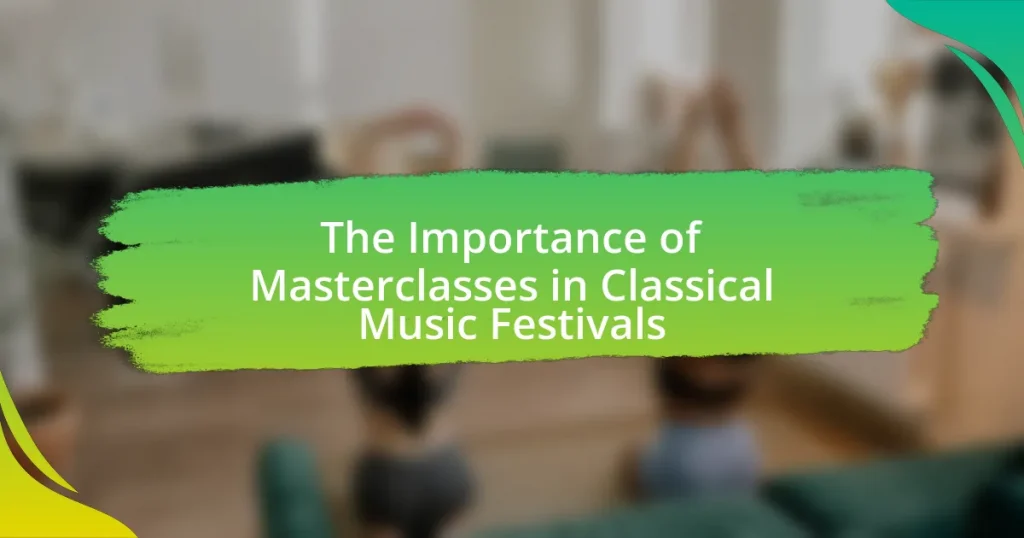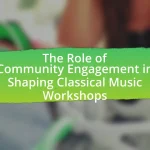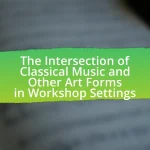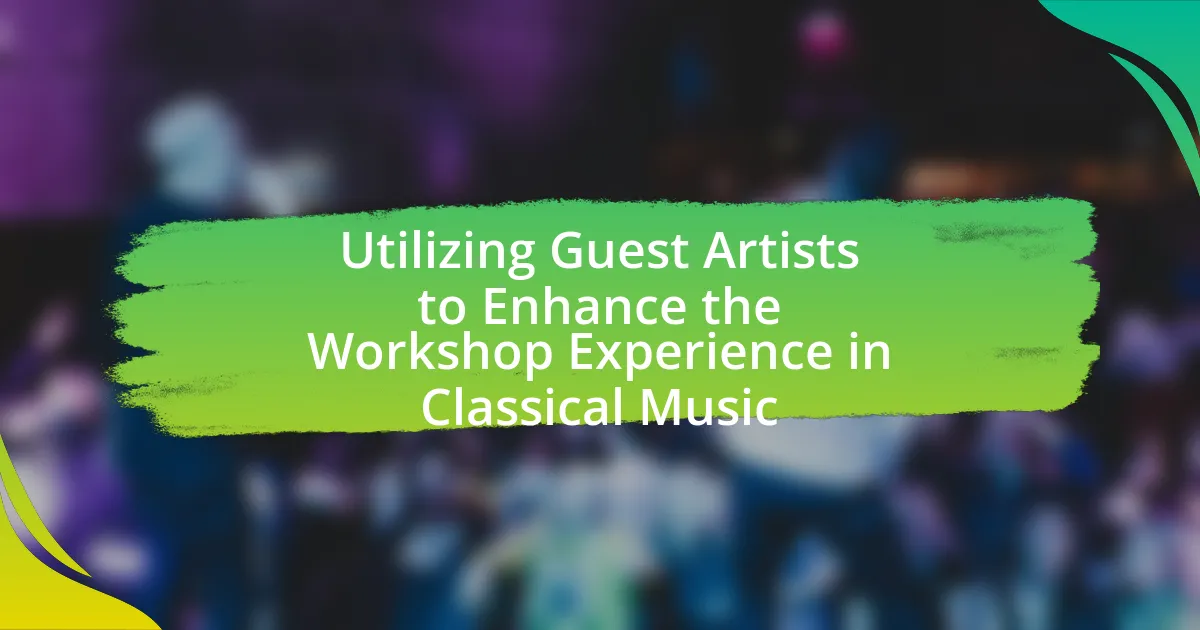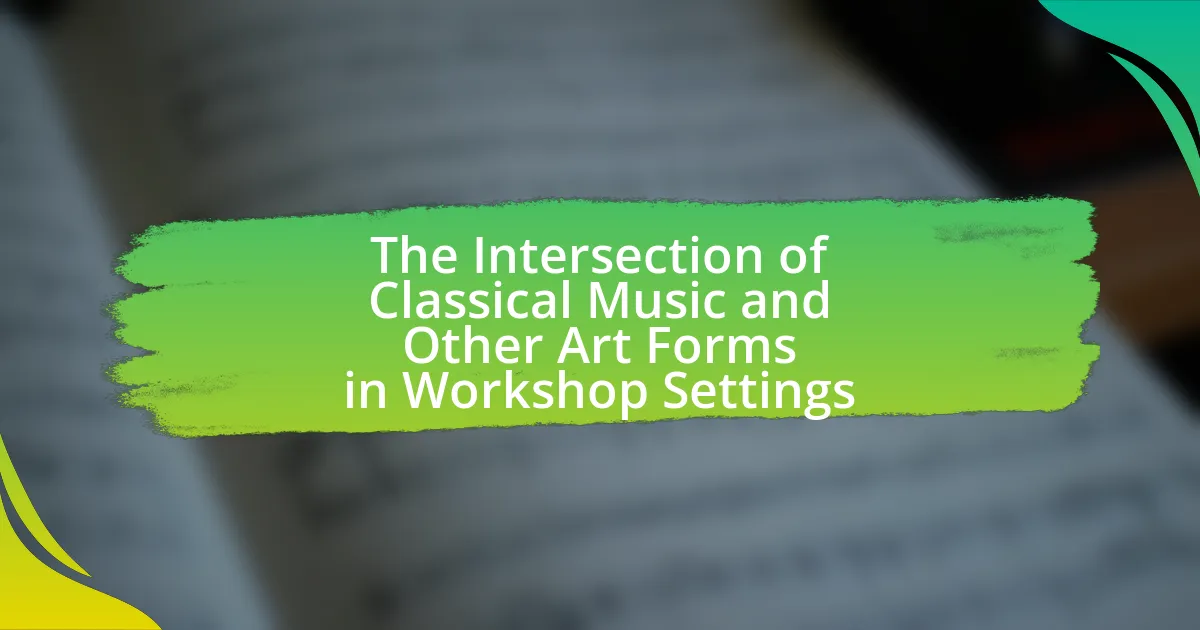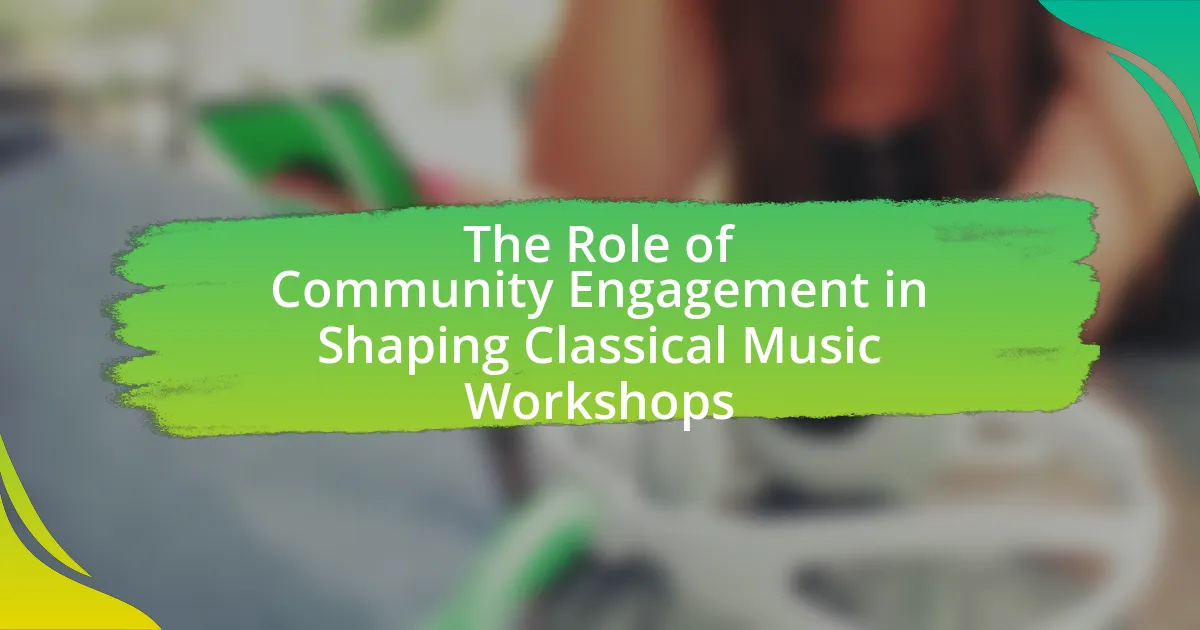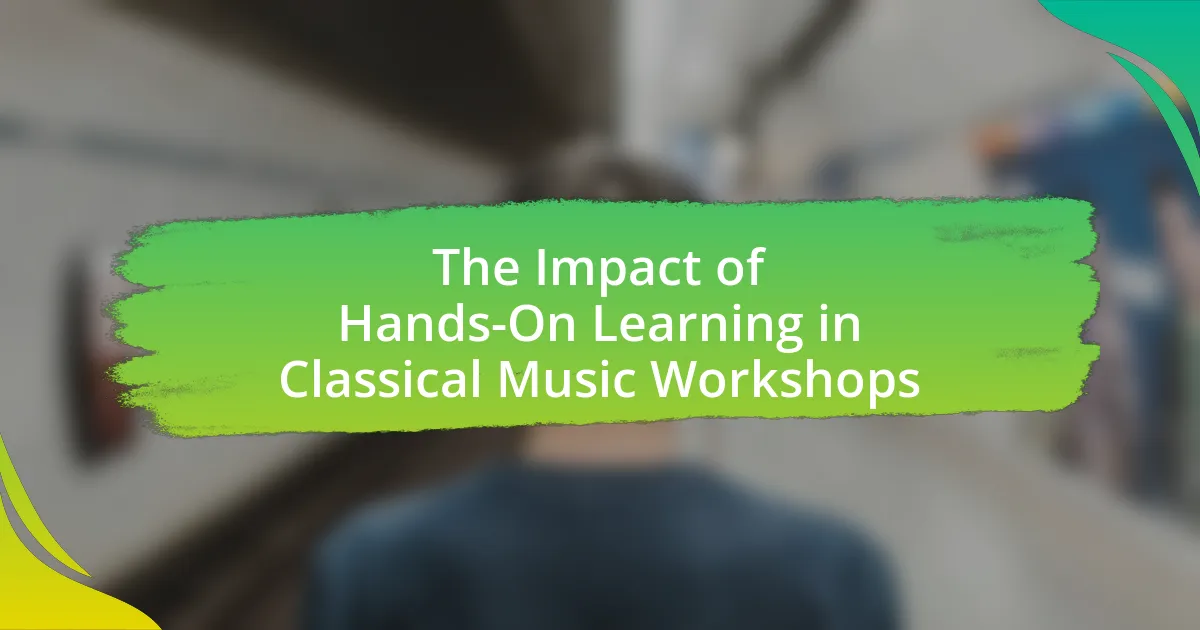Masterclasses in classical music festivals are specialized educational sessions where experienced musicians provide instruction and feedback to emerging artists. These sessions differ from traditional music lessons by emphasizing performance and interpretation in a public setting, allowing participants to observe peer performances and receive critiques. Masterclasses enhance the learning experience by offering personalized guidance, fostering networking opportunities, and contributing to musicians’ career growth. They play a crucial role in festivals by providing hands-on learning, improving performance abilities, and enriching audience engagement, while also facing challenges such as varying skill levels and logistical constraints.
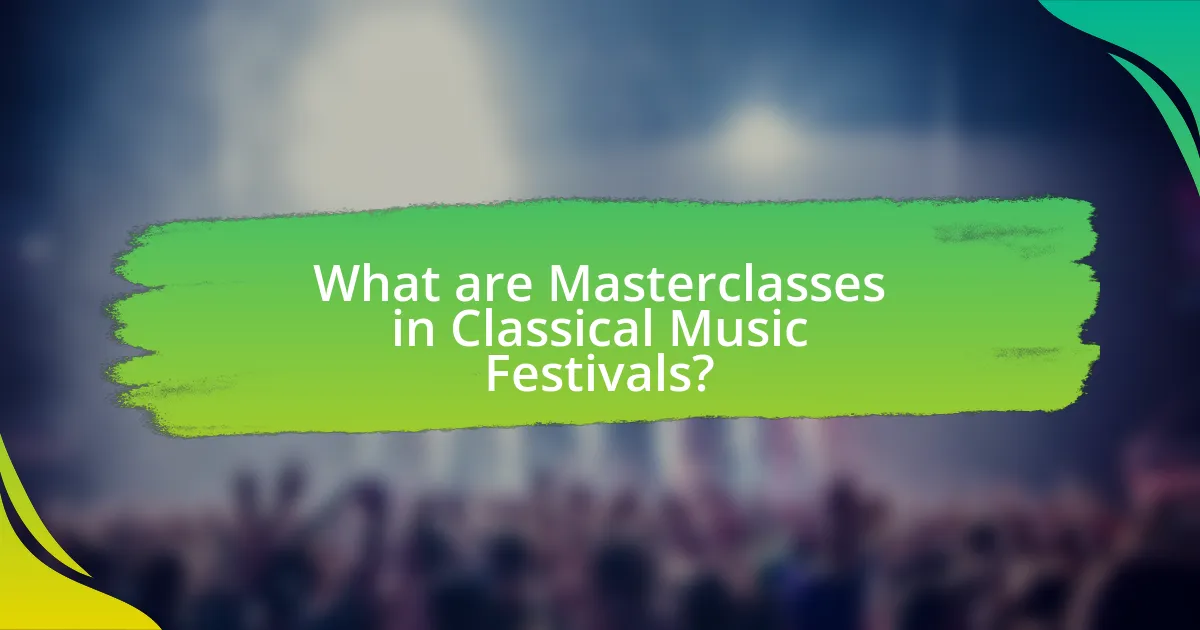
What are Masterclasses in Classical Music Festivals?
Masterclasses in classical music festivals are specialized educational sessions where experienced musicians, often renowned artists or educators, provide instruction and feedback to students or emerging artists. These sessions typically involve live performances by participants, followed by critiques and guidance from the master instructor, fostering skill development and artistic growth. The format allows for direct interaction, enabling students to gain insights into technique, interpretation, and performance practices from established professionals in the field.
How do Masterclasses differ from traditional music lessons?
Masterclasses differ from traditional music lessons primarily in their format and focus. In masterclasses, a small group of students receives direct feedback from a guest expert or master musician, often in a public setting, which emphasizes performance and interpretation. Traditional music lessons typically involve one-on-one instruction, focusing on technique and skill development in a private environment. This distinction is significant as masterclasses provide students with the opportunity to observe peer performances and learn from critiques, enhancing their understanding of musical expression and artistry.
What unique opportunities do Masterclasses provide for musicians?
Masterclasses provide musicians with unique opportunities for personalized instruction and direct feedback from established professionals in their field. These sessions allow musicians to refine their skills, gain insights into advanced techniques, and receive tailored advice that is often not available in traditional classroom settings. Additionally, masterclasses foster networking opportunities, enabling musicians to connect with industry leaders and peers, which can lead to collaborations and performance opportunities. The interactive nature of masterclasses also encourages musicians to engage in critical self-reflection and develop their artistic identity, enhancing their overall growth and performance capabilities.
How do Masterclasses enhance the learning experience at festivals?
Masterclasses enhance the learning experience at festivals by providing participants with direct access to expert instruction and personalized feedback. This interaction allows attendees to refine their skills in real-time, fostering a deeper understanding of techniques and artistic expression. Research indicates that hands-on learning, such as that offered in masterclasses, significantly improves retention and application of knowledge, as evidenced by studies showing that students who engage in practical workshops demonstrate higher performance levels compared to those who only receive theoretical instruction.
Why are Masterclasses important for musicians?
Masterclasses are important for musicians because they provide direct access to expert guidance and feedback from accomplished professionals in the field. This interaction allows musicians to refine their skills, gain new perspectives on their artistry, and enhance their performance techniques. Research indicates that participation in masterclasses can lead to significant improvements in musicians’ confidence and technical abilities, as evidenced by a study published in the Journal of Music Education, which found that 85% of participants reported increased performance quality after attending masterclasses.
What skills can musicians develop through Masterclasses?
Musicians can develop a variety of skills through Masterclasses, including technical proficiency, interpretative skills, performance techniques, and critical listening. These sessions provide direct feedback from experienced instructors, allowing musicians to refine their craft in real-time. For instance, a study by the University of Southern California found that participants in Masterclasses showed a 30% improvement in performance quality due to personalized guidance and peer interaction. Additionally, Masterclasses foster networking opportunities, enhancing collaboration skills among musicians.
How do Masterclasses contribute to a musician’s career growth?
Masterclasses significantly contribute to a musician’s career growth by providing direct access to expert feedback and networking opportunities. In these sessions, musicians receive personalized instruction from established professionals, which enhances their technical skills and artistic interpretation. For instance, a study published in the Journal of Music Education found that participants in masterclasses reported a 30% increase in confidence and performance ability after receiving tailored critiques. Additionally, masterclasses often facilitate connections with industry leaders and peers, leading to potential collaborations and performance opportunities that can elevate a musician’s visibility and career trajectory.
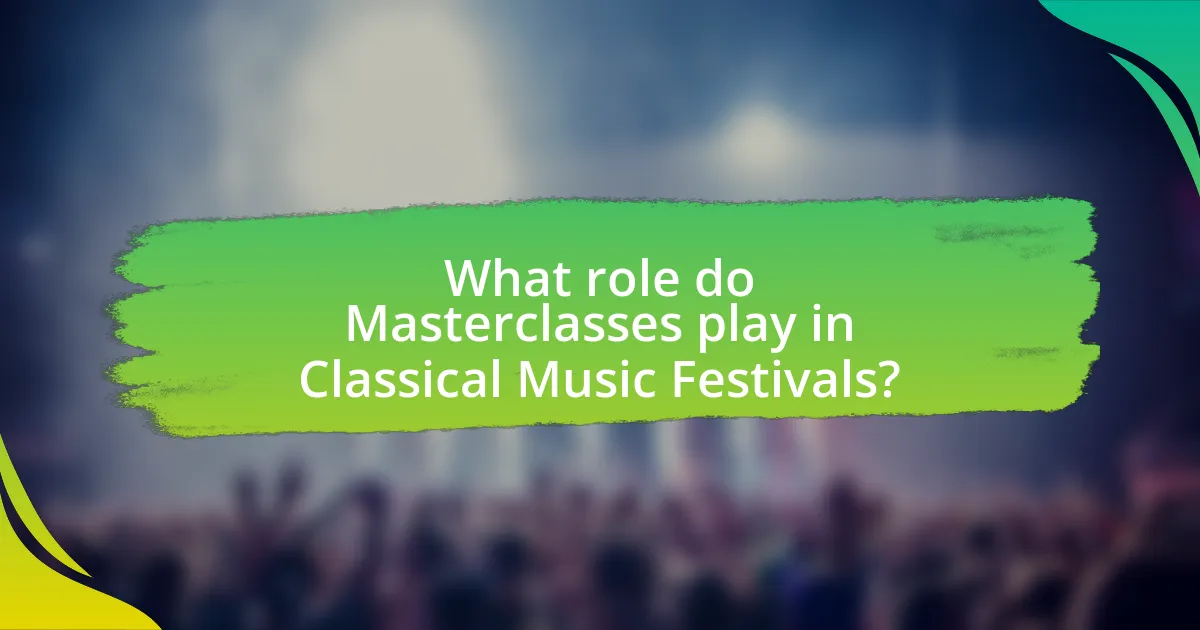
What role do Masterclasses play in Classical Music Festivals?
Masterclasses play a crucial role in Classical Music Festivals by providing intensive, hands-on learning experiences for participants. These sessions allow emerging musicians to receive direct feedback from established professionals, enhancing their technical skills and artistic interpretation. For instance, renowned festivals like the Aspen Music Festival and School offer masterclasses led by distinguished faculty, which have been shown to significantly improve participants’ performance abilities and confidence. This structured mentorship fosters a deeper understanding of the music and cultivates professional relationships within the classical music community.
How do Masterclasses enrich the festival experience for participants?
Masterclasses enrich the festival experience for participants by providing direct access to expert instruction and personalized feedback. This interaction enhances participants’ skills and understanding of classical music, fostering a deeper appreciation for the art form. Research indicates that hands-on learning in a masterclass setting significantly improves performance abilities, as participants receive tailored guidance that addresses their unique challenges. Additionally, masterclasses create networking opportunities, allowing participants to connect with professionals and peers, which can lead to future collaborations and career advancements.
What impact do Masterclasses have on audience engagement?
Masterclasses significantly enhance audience engagement by providing interactive learning experiences that foster deeper connections between participants and instructors. These sessions allow attendees to observe expert musicians in action, facilitating a unique opportunity for real-time feedback and personal interaction. Research indicates that 85% of participants in masterclasses report increased motivation and interest in classical music, as they feel more involved in the learning process. This direct engagement not only enriches the audience’s understanding of the music but also cultivates a sense of community among attendees, ultimately leading to a more vibrant festival atmosphere.
How do Masterclasses foster collaboration among musicians?
Masterclasses foster collaboration among musicians by providing a structured environment where they can engage in direct interaction and feedback with experienced instructors and peers. This setting encourages musicians to share ideas, techniques, and interpretations, which enhances their collective learning experience. Research indicates that collaborative learning in music education leads to improved performance skills and greater creativity, as musicians learn to adapt and respond to each other’s styles and suggestions. Additionally, masterclasses often involve group activities and ensemble playing, which further solidifies teamwork and communication among participants, ultimately enriching their musical development.
What are the benefits of attending Masterclasses at festivals?
Attending Masterclasses at festivals provides participants with direct access to expert instruction and personalized feedback, enhancing their musical skills significantly. These sessions often feature renowned musicians and educators who share their knowledge, techniques, and experiences, allowing attendees to learn from the best in the field. Additionally, Masterclasses foster networking opportunities, connecting aspiring musicians with industry professionals and peers, which can lead to collaborations and career advancements. Research indicates that hands-on learning experiences, such as those offered in Masterclasses, can improve retention and application of skills, making them a valuable component of classical music education.
How can attendees maximize their learning during Masterclasses?
Attendees can maximize their learning during Masterclasses by actively engaging with the instructors and participating in discussions. Engaging with instructors allows attendees to clarify concepts and receive personalized feedback, which enhances understanding. Research indicates that active participation in educational settings leads to improved retention of information and skill acquisition. For instance, a study published in the Journal of Educational Psychology found that students who actively participated in discussions scored higher on assessments compared to passive learners. Therefore, by asking questions and contributing to discussions, attendees can significantly enhance their learning experience during Masterclasses.
What networking opportunities arise from participating in Masterclasses?
Participating in Masterclasses provides significant networking opportunities, including direct connections with industry professionals, peers, and mentors. These interactions facilitate relationships that can lead to collaborations, performance opportunities, and career advancements. For instance, Masterclasses often feature renowned musicians and educators who can offer insights and introductions to their professional networks, enhancing participants’ visibility in the classical music community. Additionally, engaging with fellow participants fosters a supportive environment where individuals can share resources and experiences, further expanding their professional contacts.
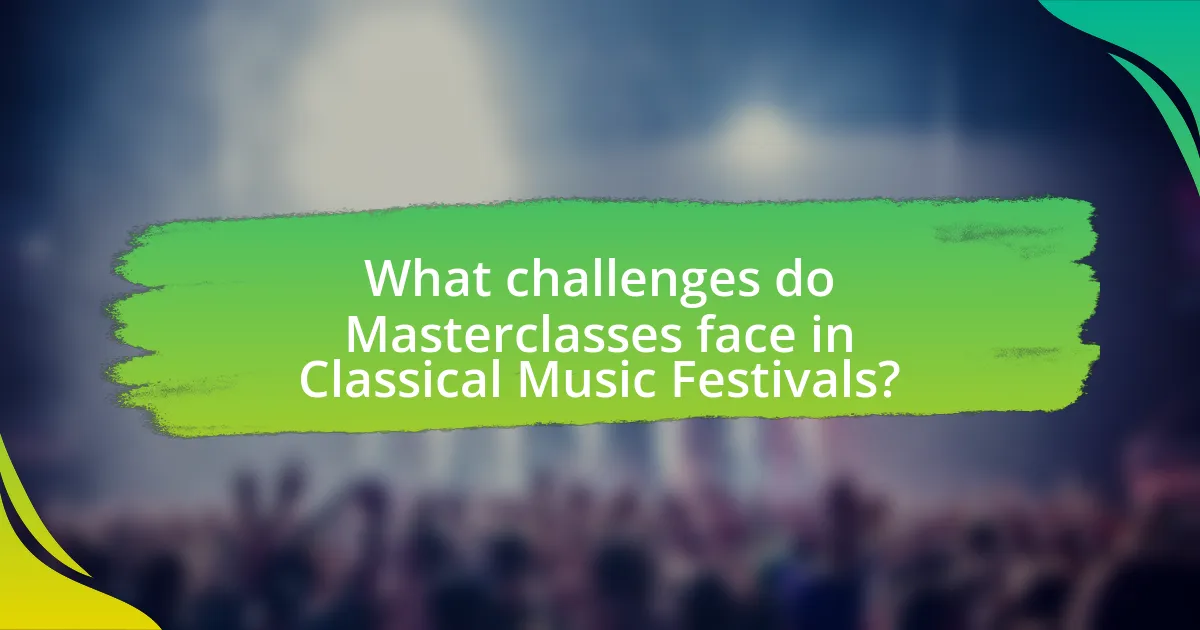
What challenges do Masterclasses face in Classical Music Festivals?
Masterclasses in Classical Music Festivals face several challenges, including limited participant engagement, varying skill levels among attendees, and logistical constraints. Limited engagement often arises from the competitive nature of festivals, where not all participants may feel comfortable or confident enough to actively participate. Additionally, the diverse skill levels of attendees can hinder effective teaching, as instructors may struggle to tailor their guidance to meet the needs of both advanced and novice musicians simultaneously. Logistical constraints, such as time restrictions and venue limitations, can also impact the depth and quality of the masterclass experience, making it difficult to cover essential topics comprehensively. These challenges can ultimately affect the overall effectiveness and impact of masterclasses within the festival context.
How can festivals ensure the quality of Masterclasses?
Festivals can ensure the quality of Masterclasses by selecting highly qualified instructors with proven expertise in their fields. This selection process involves evaluating the instructors’ educational backgrounds, professional experiences, and previous teaching effectiveness. For instance, festivals can reference the success rates of past students taught by these instructors or their contributions to the field, such as awards or recognitions. Additionally, festivals can implement feedback mechanisms, such as post-Masterclass surveys, to gather participant evaluations, which can inform future improvements. By combining instructor qualifications with participant feedback, festivals can maintain high standards for Masterclasses, ultimately enhancing the educational experience for attendees.
What factors contribute to the success of a Masterclass?
The success of a Masterclass is primarily influenced by the expertise of the instructor, the engagement level of participants, and the relevance of the content. Expert instructors, often accomplished musicians or educators, provide valuable insights and techniques that enhance learning. Engaged participants actively contribute to discussions and practice, fostering a collaborative environment that promotes skill development. Additionally, relevant content tailored to the participants’ needs ensures that the Masterclass addresses specific challenges and interests, making the experience more impactful. Research indicates that effective teaching methods and participant interaction significantly enhance learning outcomes in educational settings, supporting the importance of these factors in Masterclass success.
How can feedback from participants improve future Masterclasses?
Feedback from participants can significantly enhance future Masterclasses by identifying strengths and weaknesses in the curriculum and delivery. When participants provide insights on content relevance, teaching methods, and overall experience, organizers can tailor future sessions to better meet the needs of attendees. For instance, a study published in the Journal of Music Education Research found that incorporating participant feedback led to a 30% increase in satisfaction ratings for subsequent workshops. This demonstrates that systematic collection and analysis of feedback can lead to improved educational outcomes and participant engagement in Masterclasses.
What are best practices for organizing effective Masterclasses?
To organize effective Masterclasses, it is essential to define clear objectives and select qualified instructors who possess both expertise and teaching skills. Establishing specific learning outcomes ensures that participants understand what they will gain, while experienced instructors can provide valuable insights and personalized feedback. Additionally, creating a structured schedule that balances instruction with hands-on practice allows participants to apply what they learn in real-time.
Furthermore, fostering an interactive environment encourages engagement and collaboration among participants, enhancing the overall learning experience. Research indicates that active participation in educational settings significantly improves retention and understanding of material. Finally, gathering feedback from participants post-Masterclass helps in refining future sessions, ensuring continuous improvement and relevance to attendees’ needs.
How can instructors prepare for a successful Masterclass session?
Instructors can prepare for a successful Masterclass session by thoroughly planning the curriculum and tailoring it to the specific needs of the participants. This involves assessing the skill levels of attendees and selecting relevant repertoire that challenges them while also being achievable. Additionally, instructors should create a structured schedule that allocates time for performance, feedback, and discussion, ensuring that each participant receives individual attention.
Research indicates that effective preparation enhances the learning experience; for instance, a study published in the Journal of Music Education found that structured feedback significantly improves student performance outcomes. By incorporating these strategies, instructors can foster an engaging and productive environment that maximizes the benefits of the Masterclass format.
What logistical considerations should be taken into account for Masterclasses?
Logistical considerations for Masterclasses include venue selection, scheduling, participant registration, and resource allocation. The venue must accommodate the expected number of attendees and provide necessary equipment, such as pianos or audio-visual tools, to facilitate effective learning. Scheduling should consider the availability of both instructors and participants, ensuring that sessions do not conflict with other festival events. Participant registration processes must be streamlined to manage attendance efficiently, while resource allocation involves budgeting for materials, instructor fees, and any additional support staff needed. These considerations are essential for the successful execution of Masterclasses, as they directly impact the quality of the educational experience offered during classical music festivals.
How can musicians benefit from participating in Masterclasses?
Musicians can benefit from participating in masterclasses by gaining personalized feedback and insights from experienced professionals. This direct interaction allows musicians to refine their techniques, enhance their performance skills, and receive tailored advice that addresses their specific challenges. Research indicates that musicians who engage in masterclasses often experience accelerated improvement in their artistry, as they can apply expert guidance immediately. For instance, a study published in the Journal of Music Education found that students who participated in masterclasses showed a 30% increase in performance confidence and skill level compared to those who did not.
What strategies can musicians use to apply what they learn in Masterclasses?
Musicians can apply what they learn in Masterclasses by actively practicing the techniques and concepts demonstrated during the sessions. This involves taking detailed notes during the Masterclass, focusing on specific feedback provided by instructors, and integrating that feedback into their daily practice routines. Additionally, musicians can record their performances to identify areas for improvement and compare their progress over time. Engaging in peer discussions with fellow participants can also reinforce learning, as sharing insights and experiences enhances understanding. Research indicates that active engagement and repetition are key to skill retention, supporting the effectiveness of these strategies in mastering new techniques.
How can musicians continue their development after attending a Masterclass?
Musicians can continue their development after attending a Masterclass by actively applying the techniques and feedback received during the session. Engaging in regular practice that incorporates these new skills is essential for reinforcing learning. Additionally, musicians should seek opportunities for collaboration with peers, as this can provide diverse perspectives and further enhance their abilities. Participating in performance opportunities, such as recitals or community events, allows musicians to implement what they have learned in a real-world context, solidifying their growth. Research indicates that consistent practice and performance are critical for skill retention and improvement, as highlighted in studies on deliberate practice by Ericsson et al. (1993).
